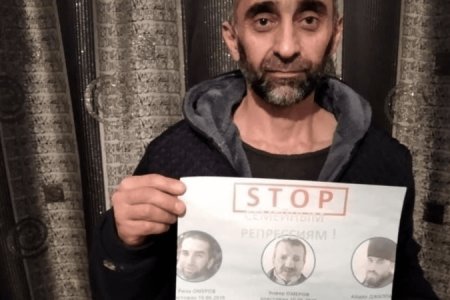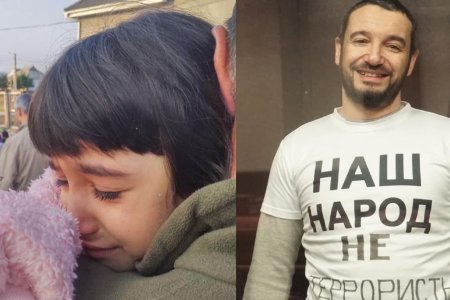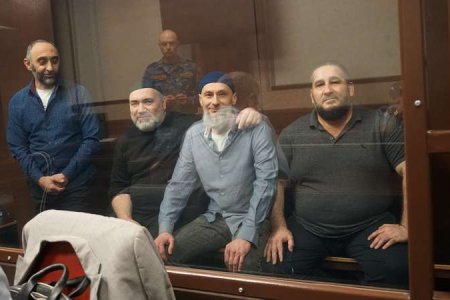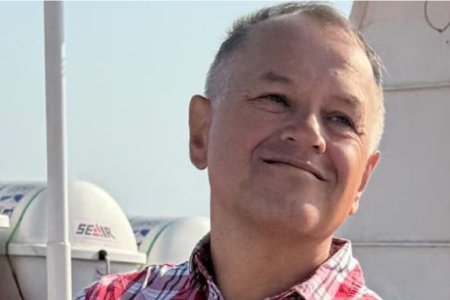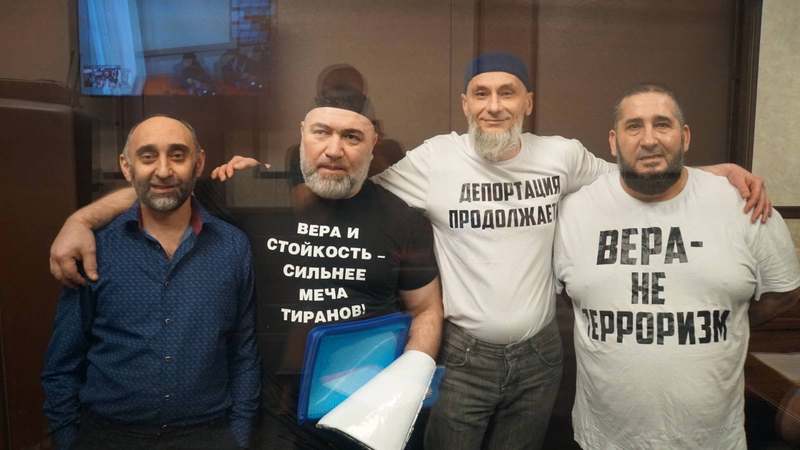
Four Crimean Tatar civic activists have been sentenced to a total of 53 years in the latest of Russia’s judicial travesties, directed against the Crimean Tatar human rights movement and at those who hold ‘dissident views’ in occupied Crimea. The men were not charged with any actual crimes, and in one case the ‘court’ acted with the prosecution in disregarding the fact that one of the men had not been recognized in an identification parade.
Zavur Abdullayev (b. 1973); Dzhebbar Bekirov (b. 1970); Rustem Murasov (b. 1972) and Rustem Taiirov (1970) all played an active role in attending political trials, either in occupied Crimea, or at the same Southern District Military Court in Rostov where they themselves were put on trial. They also took part in flashmobs and other civic initiatives in solidarity with victims of repression and actively helped the families of political prisoners. It is more than likely that this is why each of the men was targeted by Russia’s FSB and scarcely a coincidence that Rustem Murasov was arrested after he arrived back home after travelling to Rostov for the sentencing of four other recognized political prisoners.
These are individual tragedies, both for the men targeted, and for their families. Russia has, however, turned them into conveyor-belt prosecutions, with essentially identical charges and fabricated ‘evidence’. The charges are based solely on allegations of involvement in Hizb ut-Tahrir, a peaceful transnational Muslim organization which is legal in Ukraine. Russia’s Supreme Court has never explained why it declared Hizb ut-Tahrir ‘terrorist’ in 2003 and why it kept this inexplicable ruling secret until it could no longer be challenged. In 2013, Russia’s FSB began improving its statistics on supposedly ‘fighting terrorism’ by bringing ‘terrorism’ charges purely over unproven claims of involvement in Hizb ut-Tahrir, with Russian courts obligingly passing huge sentences without any recognizable crime.
The arrests on these profoundly flawed charges began in 2015 and soon became a weapon against Crimean Tatar civic journalists and activists, especially from the important Crimean Solidarity human rights movement. At least one person, in this case, Dzhebbar Bekirov, is charged with the more serious ‘organizer’ role (under Article 205.5 § 1 of Russia’s criminal code) while the others face the lesser ‘involvement’ in such an entirely unproven under Article 205.5 § 2. The decision as to who is designated ‘organizer’ is sometimes politically motivated (used if a person has refused to be silent about FSB torture, or similar), and essentially always seems arbitrary. It does, however, make a large difference to the sentence. The FSB, via the prosecutor, have been known to accept lower sentences than those demanded against men accused only of ‘involvement’. They do not tolerate significant deviations when it comes to those accused of being the organizer.
The four men in their fifties were also charged under Article 278 with ‘planning to violently seize power and change Russia’s constitutional order’. The charge may sound alarming, but is, in fact, based on the same 2003 ruling, and is unrelated to any specific allegations against any of the defendants.
The armed raids of the men’s homes were, in theory, ‘searches’, however the enforcement officers make no pretence of looking for anything except ‘prohibited religious literature’. In at least some of the raids on 17 August 2021, the FSB brought the ‘prohibited’ material which they then claimed to have ‘found’. Such violations of the men’s rights are the reason why their lawyers are invariably prevented from being present.
There were multiple violations throughout the ‘trial’ held at the Southern District Military Court. As mentioned, these included the fact that one of the so-called ‘anonymous (secret) witnesses’ had identified another person as Taiirov during the identification parade. The ‘court’ simply went along with the prosecutor in claiming that this was a ‘typo’.
This ‘trial’, like its predecessors, was based on planted ‘prohibited literature’; on the commissioned ‘assessments’ by FSB-loyal ‘experts’ of an illicitly taped conversation and on the testimony of secret witnesses, one of whom did not recognize Taiirov in an identification parade. The conversation, between Bekirov, Murasov and Taiirov could not have been more innocuous. The men discussed making a call to Islam, citing passages in the Quran, and also considered how to discuss religious topics with representatives of other faiths. They agreed that one should speak politely, accurately and with restraint, and without angry interrogation. Murasov, for example, spoke of his meeting and dialogue with Jehovah’s Witnesses.
On the basis of the above, prosecutor Igor Nadolinsky had demanded a 19-year harsh-regime sentence against Bekirov and 15-year sentences against the other three men. On 31 May, ‘judges’ Sergei Gorelov (presiding), together with Nikolai Gulko and Timur Mashukov sentenced Dzhebbar Bekirov to 17 years’ harsh-regime imprisonment, with the first four years in a prison, the worst of Russia’s already appalling penal institutions. The court then added a 18 month term of restricted liberty. Zavur Abdullayev, Rustem Murasov and Rustem Tairov were sentenced to 12 years, also with the first four in prison, and later a one-year term of restricted liberty.
The sentences will all be challenged, however the Military Court of Appeal in Vlasikha (Moscow region) has thus far demonstrated the same lack of concern about the flawed charges and fabricated evidence.
These ‘trials’ have all been condemned by the Memorial Centre for the Defence of Human Rights and the men’s release has been demanded by international bodies and democratic countries.
Please write to Dzhebbar Bekirov; Zavur Abdullayev; Rustem Murasov and Rustem Taiirov!
The men are all imprisoned, far from their families, in the Russian city of Rostov, and will likely remain there until after the appeal hearing. Letters tell them and the authorities in Moscow that they are not forgotten. Letters need to be in Russian, and on ‘safe’ subjects. If that is a problem, use the sample letter below (copying it by hand), perhaps adding a picture or photo. Do add a return address so that the men can answer. The addresses can be written in either Russian or in English transcription. The particular addressee’s name and year of birth need to be given.
Sample letter
Привет,
Желаю Вам здоровья, мужества и терпения, надеюсь на скорое освобождение. Простите, что мало пишу – мне трудно писать по-русски, но мы все о Вас помним.
[Hi. I wish you good health, courage and patience and hope that you will soon be released. I’m sorry that this letter is short, it's hard for me to write in Russian, but you are not forgotten.]
Dzhebbar Bekirov
344022, Россия, Ростов-на-Дону, ул. Максима Горького, 219 СИЗО-1.
Бекирову, Джеббару Сейрановичу г.р. 1970
[In English: 344022 Russian Federation, Rostov on the Don, 219 Maxim Gorky St, SIZO-1
Bekirov, Dzhebbar Seiranovych, b. 1970 ]
Zavur Abdullayev
344022, Россия, Ростов-на-Дону, ул. Максима Горького, 219 СИЗО-1.
Абдуллаеву, Завуру Абибуллаевичу, г.р. 1973
[In English: 344022 Russian Federation, Rostov on the Don, 219 Maxim Gorky St, SIZO-1
Abdullayev, Zavur Abibullayevych, b. 1973 ]
Rustem Murasov
344022, Россия, Ростов-на-Дону, ул. Максима Горького, 219 СИЗО-1.
Мурасову, Рустему Себатовичу, г.р. 1972
[In English: 344022 Russian Federation, Rostov on the Don, 219 Maxim Gorky St, SIZO-1
Murasov, Rustem Sebatovych, b. 1972 ]
Rustem Taiirov
344022, Россия, Ростов-на-Дону, ул. Максима Горького, 219 СИЗО-1.
Таирову, Рустему Мансуровичу
[In English: 344022 Russian Federation, Rostov on the Don, 219 Maxim Gorky St, SIZO-1
Taiirov, Rustem Mansurovych, b. 1970 ]
